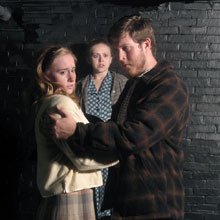
IN FRONT OF THEIR FACES Moral and familial questions abound in Miller’s View. |
"Justice is very important here," intones Mr. Alfieri (Patrick Molloy), an aged Italian-American lawyer and the sorrowful Greek chorus of Arthur Miller's A View From The Bridge. "Here" is the working class Red Hook, Brooklyn of 1954, a time and place of rough Italian longshoremen, a corrupt but functional labor syndicate, and the constant threat of immigration raids. And justice, or the desire for it, takes many forms, both in and beyond the letter of the law. Thomas Power directs USM actors in a beautifully subtle production of this tragedy.Eddie Carbone (Matthew Defiore) has worked hard on the docks for years to provide for his wife Bea (Dolly Constantine) and her dead sister's daughter Catherine (Laura Collard), who has long been the light of his life. But things are changing: She's started wearing high heels and shorter skirts, and though she's as chaste and respectful as they come, Eddie feels his solid domestic and emotional ground shifting beneath him. As his distress mounts, we see what he doesn't quite suspect himself: that his love for his niece is not altogether healthy, or proper.
The situation is compounded when the family takes in Marco and Rodolpho (Jacob Cote and Dalton Kimball), who are here illegally from Italy, and there are immediate sparks between Catherine and the charismatic, jazz-singing Rodolpho. Eddie nastily baits his rival, questions his motives, and, most interestingly, insinuates that he's gay, all in the interest of keeping Catherine all to himself in his own house. Charles Kading's stunning set gracefully contrasts the comfort of that dull, dun-mauve house, with the brick alley outside — narrow but dramatically high, and shot with light dappled through leaves we can't see — where anything might happen to change what he knows.
Thanks to Mr. Alfieri's melancholy narrations (and Molloy is excellent; his fine-boned features and elegant, restrained gestures bespeak a thoughtful gentility not quite at home in Red Hook, nor possibly in America), we know nothing good is coming. The suspense, then, is in watching the characters' harrowing evolutions as the tragedy builds, and Power's cast delivers some remarkable performances. Constantine's Bea, when she talks, is all spit and vinegar and staccato hands, but in her silences she conveys the stoic resignation of Bea's lot in as little as her posture, her short moment of motionless self-appraisal in a mirror, and it's heartbreaking to watch her slow realizations about her husband take hold in her face.
As the unwitting center of Eddie's angst, Collard has exquisite, striking candor and sensitivity, and a lovely, bird-like fluency with Catherine's patois of patter. She also makes beautifully nuanced work of Catherine's arc, maturing into a woman apace her agonizing disillusionment with her uncle. As her lover, the blond and theatrical Rodolpho, Kimball is graceful, funny, and full of life; he too navigates a wonderfully subtle shift from early sexual attraction to deeper feeling and understanding about what Catherine's going through.
And as the man whose asks the impossible of her, Defiore fully conveys his sad-sack pathos, self-doubt, and susceptibility; his Eddie wrenches the heart when he chokes up and breaks down.